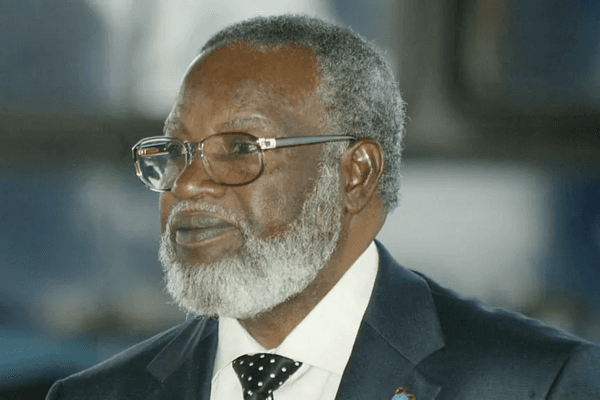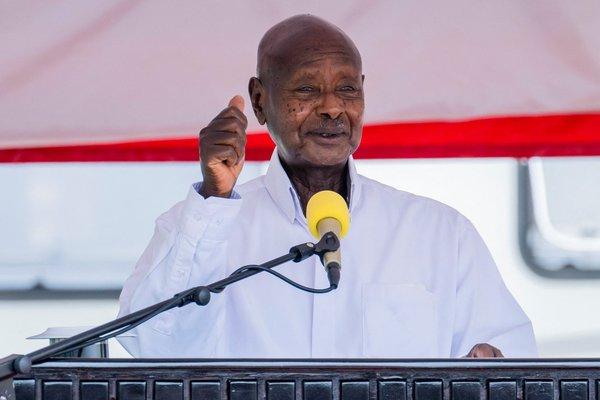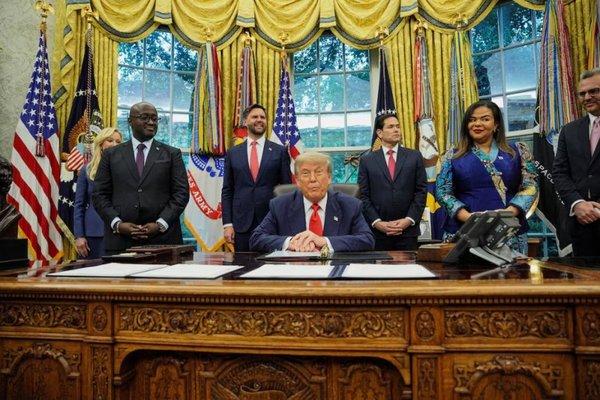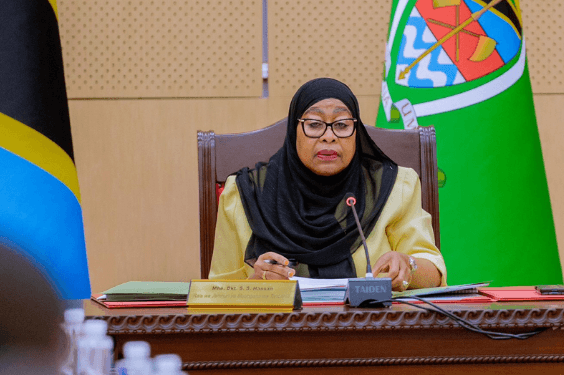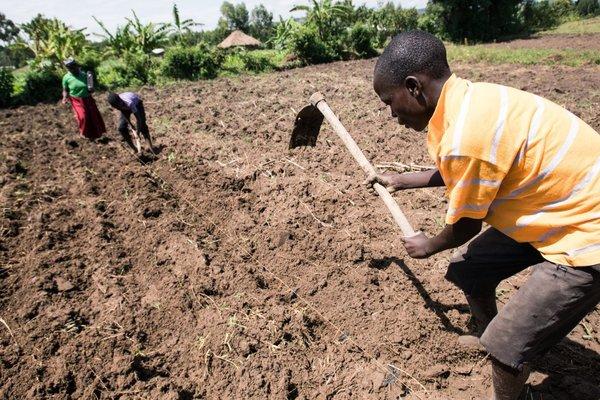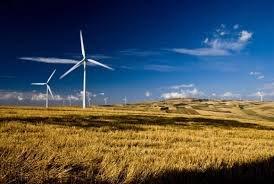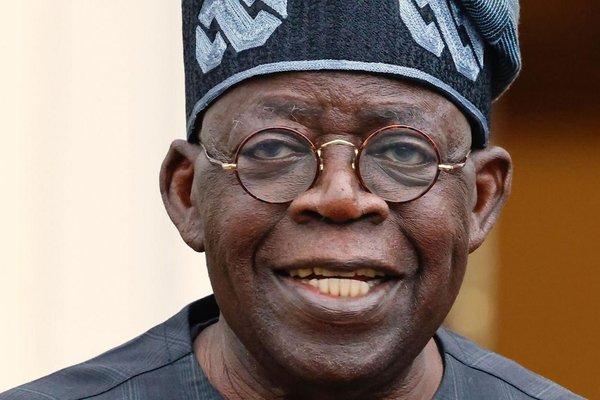Algeria
Algeria is a country in North Africa, located on the Mediterranean coast. It is the largest country in Africa by land area and the 10th largest in the world.

North Africa

2.38 million sq km

GMT+1

46 Million(2023)

Arabic, Berber

Islam, Christianity

Algerian dinar (DZD)

Abdelmadjid Tebboune
Brief
Algeria, a vast country in North Africa, is bordered by Tunisia, Libya, Niger, Mali, Mauritania, Western Sahara, Morocco, and the Mediterranean Sea. It is the largest country in Africa, covering more than 2.3 million square kilometers, most of which is dominated by the Sahara Desert. This arid region contrasts with the fertile coastal plains and the Atlas Mountain range that stretches along its northern edge. Historically, the region has been home to indigenous Berber peoples (called Imazighen, singular: Amazigh), whose presence dates back thousands of years. In antiquity, the area was influenced by various civilizations, including the Phoenicians, who established the ancient city of Carthage, and later the Romans, who integrated Algeria into the Roman Empire.
In the 7th century CE, the Arab conquest introduced Islam to the region, and it became part of the broader Maghrib (the "West" in Arabic). The majority of the population today is Sunni Muslim, with Arabic and Berber as the official languages. The medieval history of Algeria is marked by several powerful Berber dynasties, such as the Almoravids, who ruled over a vast empire from Andalusia (southern Spain) to sub-Saharan Africa in the 11th century.
From the 16th century, Algeria became part of the Ottoman Empire, though its coastal regions were controlled by pirates known as the Barbary Corsairs. The French colonized Algeria in 1830, leading to over a century of exploitation and brutal oppression of the indigenous population. The resistance against French rule was fierce, culminating in the Algerian War of Independence (1954-1962), which resulted in the country's liberation. This war, marked by heavy loss of life and atrocities on both sides, led to Algeria gaining its independence on July 5, 1962.
In the post-independence period, Algeria became a one-party socialist state under the leadership of the National Liberation Front (FLN). However, the country faced internal instability in the 1990s, when Islamist insurgents launched a brutal civil war following the cancellation of elections in which an Islamist party had been poised to win. The war, lasting through the 1990s, claimed the lives of tens of thousands and left the country deeply scarred.
Today, Algeria is a republic with a semi-presidential system, and the country remains heavily dependent on its vast natural resources, particularly oil and gas. Despite the challenges posed by corruption, youth unemployment, and political tensions, Algeria is working toward economic diversification. The capital city, Algiers, is an important port and cultural center, known for its historic sites and vibrant Mediterranean lifestyle. Other major cities include Oran, Constantine, and Tlemcen, which reflect the country's mix of Arab, Berber, and French colonial influences.
The economy, although largely reliant on oil and gas, also includes agriculture, with wheat, barley, and dates being major products. The country is also famous for its rich cultural heritage, which blends Arab, Berber, and French influences, reflected in its music, literature, cuisine, and architecture.
Algeria's political landscape is still evolving, with significant demand for reform. Recent protests have called for more political freedoms and greater accountability from the ruling elite. While Algeria remains a major player in North Africa, it faces ongoing challenges related to governance, economic diversification, and social integration.
Algeria's vast Sahara Desert, rich historical sites, and dynamic cities make it a country of great cultural and natural diversity, but it remains deeply affected by its colonial past and ongoing efforts for political and economic modernization.
Photos and Videos




National anthem
Cultural Life
Cultural milieu
The cultural milieu of Algeria is rich, diverse, and deeply rooted in its long history, shaped by various civilizations, ethnicities, and religions. It reflects a blend of Berber, Arab, French, and Islamic influences, making it a unique cultural landscape in North Africa. The indigenous people of Algeria, the Berbers (Imazighen), have been living in North Africa for thousands of years. Their presence is especially felt in the mountainous regions, such as the Kabylie, Aurès, and M'zab areas. The arrival of Arabs in the 7th century CE, following the Islamic expansion, greatly influenced the region's culture, language, and religion. Arabic became the dominant language, and Islam became the primary religion, shaping many aspects of daily life, from festivals and customs to laws and societal values. French colonization from 1830 to 1962 had a profound impact on Algeria’s cultural landscape. While Algeria was under French rule, the French language and culture permeated many aspects of life, particularly in education, literature, architecture, and urban planning.
French remains a widely spoken language in Algeria, especially in business and higher education, and its influence can be seen in the country's culinary traditions, art, and fashion. Raï is one of the most famous music genres to emerge from Algeria, particularly from the city of Oran. It blends traditional Bedouin music, Arab music, and Western influences like jazz and rock. Artists like Cheb Khaled, Cheb Mami, and Rachid Taha have brought Raï to international prominence. Chaâbi is another popular genre, originating from Algiers. It blends Arab-Andalusian music with local folk rhythms. The lyrics often focus on the experiences of the working-class and the struggles of everyday life. Berber music (especially from the Kabylie region) includes instruments like the bendir (frame drum) and the mandole (a type of string instrument). The music often accompanies traditional dances and is a way of expressing the Berber cultural identity. Sufi music is an integral part of spiritual life in Algeria. The music, often associated with religious ceremonies, is designed to bring listeners closer to God and features chants, drums, and flutes.
Daily life and social customs
Algeria’s daily life and social customs are deeply influenced by its Islamic traditions, Berber heritage, and French colonial past, creating a unique cultural blend that is reflected in the everyday experiences of its people. From the way meals are shared to the structure of family life, these customs are essential to understanding the cultural fabric of the country. Algerian society is family-oriented, with extended families often living together or nearby. The nuclear family is the core, but grandparents, aunts, uncles, and cousins all play an important role in the lives of individuals, particularly in rural areas. Elders are highly respected in Algerian culture, and their opinions are often valued above those of younger family members. It is common for younger people to consult elders for advice on major life decisions, such as marriage and career choices. While gender roles have evolved, traditional roles still influence daily life, especially in rural communities. Men generally handle public life, work, and decision-making, while women traditionally focus on the home and children. However, in urban areas, many women are entering the workforce and participating more in public life. Marriage is a central social institution in Algeria, and it often involves extensive family involvement. Arranged marriages are still common, though love marriages are increasingly prevalent. The dowry (known as mahr) is an important part of marriage negotiations. After marriage, women are expected to take on household duties, but they are also empowered by their role in maintaining family honor and stability. Algerians typically greet each other with a handshake, although close friends and family may embrace or kiss on both cheeks (usually starting on the right). The phrase "As-salamu alaykum" (Peace be upon you) is commonly used as a greeting, with the response being "Wa alaykum as-salam" (And peace be upon you). Algerians are known for their hospitality. If you visit someone's home, you will often be offered tea or coffee and may be invited to stay for a meal, even if you are a stranger. Refusing hospitality is considered impolite. The typical workweek in Algeria runs from Sunday to Thursday, with Friday being reserved for prayer and rest. This reflects the country's Islamic practices, where Friday is a holy day. Schooling is mandatory for children between ages 6 and 16, and while the Arabic and French languages are taught, many families use Berber at home, especially in the Kabylie region. Algerians love to gather around meals, and family meals are a time for conversation, connection, and storytelling. Sharing food with others is common, and it is a way to strengthen bonds. During Ramadan, the daily routine changes drastically. Muslims fast from dawn to dusk, refraining from eating or drinking. The breaking of the fast, called iftar, is a festive time, and families gather to share a large meal that includes dates, soup, bread, and sweets.



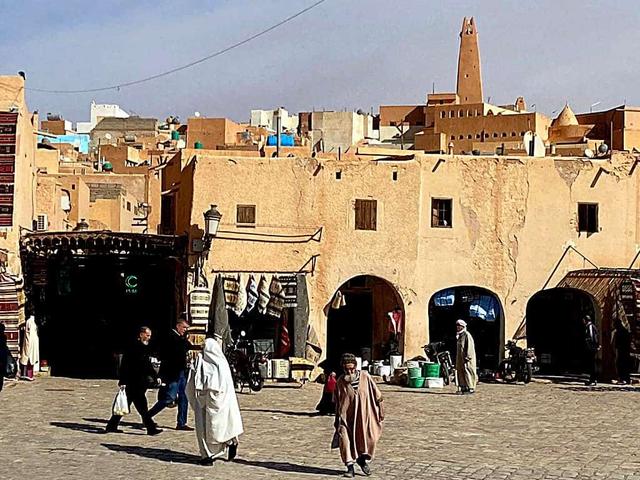

Cuisine
Algerian cuisine is a vibrant blend of Berber, Arab, Ottoman Turkish, and French influences, shaped by centuries of migration, trade, and cultural exchange. The Mediterranean climate and Saharan desert geography contribute to a diverse array of ingredients and cooking styles. Meals are often communal, with an emphasis on family and hospitality, and traditional food plays a central role in social and religious gatherings. The most iconic dish in Algerian cuisine, couscous is made from steamed semolina wheat and served with vegetables, stews, or meats. It's a quintessential part of both everyday meals and festive occasions. Olive oil is widely used in cooking, particularly in salads, frying, and drizzling over dishes. Algeria’s Mediterranean climate is ideal for olive cultivation, and the country is one of the largest olive oil producers in the region. Lamb and Chicken: These are the most common meats used in Algerian cooking. Tomatoes, onions, eggplants, zucchini, and carrots are staples, often featured in stews, soups, and salads. Dried apricots, dates, figs, and raisins are common ingredients in both savory and sweet dishes. Almonds and pistachios are also frequently used in desserts and pastries. The use of spices such as cumin, coriander, cinnamon, paprika, ginger, and saffron adds warmth and depth to many Algerian dishes. Ras el Hanout, a spice mix often including cinnamon, cumin, and cloves, is a signature flavor in Algerian cuisine.
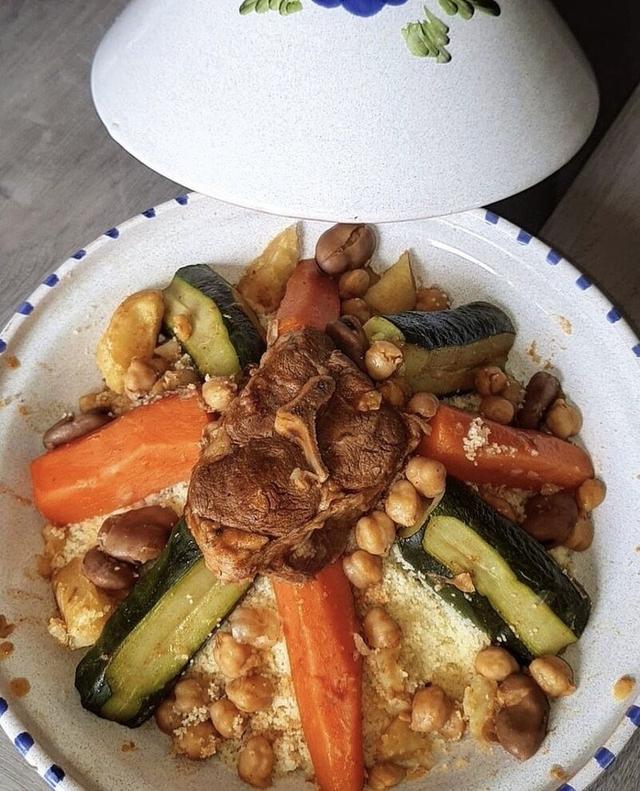
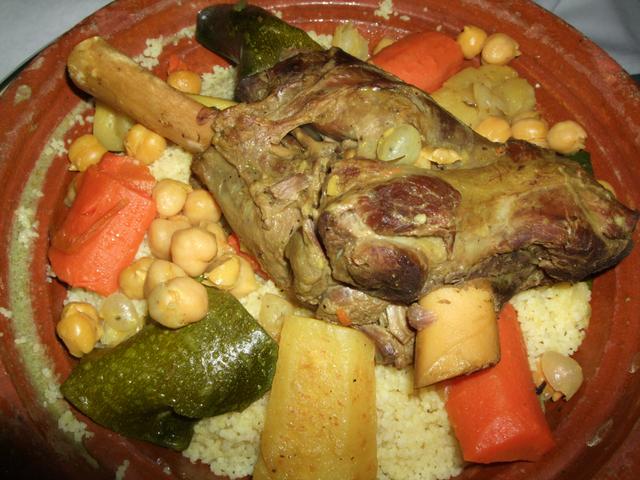


Music
The music of Algeria is deeply intertwined with its diverse cultural and historical influences, reflecting its Berber roots, Arab heritage, Islamic spirituality, French colonial history, and Saharan desert traditions. Algerian music encompasses a wide range of genres, each rooted in the country's varied regions and communities, and often serves as a reflection of social, cultural, and political dynamics. Raï is the most internationally recognized genre of Algerian music. Originating in the Oran region in the 1920s, it blends traditional Algerian folk music with modern Western influences such as jazz, blues, rock, and funk. The word Raï translates to "opinion" or "advice" in Arabic, signifying its role in expressing the sentiments of everyday people. Traditional Raï is based on rhythms of the Bedouin and Berber musical traditions, utilizing drums, flutes, and lutes, while more modern Raï incorporates synthesizers, electric guitars, and bass. Raï became popular among youth in Algeria and beyond, especially in the 1980s and 1990s, with artists like Cheb Khaled, Cheb Mami, and Cheb Hasni at the forefront of the genre. Cheb Khaled, known as the King of Raï, brought the genre to global attention with hits like "Didi" and "Aïcha". Lyrics in Raï music often touch on themes of love, social issues, freedom, and protest against political and social injustices, resonating with the struggles of youth in Algeria and the wider Arab world. Chaâbi music, meaning "folk" or "popular" in Arabic, is a genre rooted in Algiers and combines Andalusian classical music with local North African traditions. Chaâbi blends poetry, melancholic lyrics, and dance rhythms, and is often performed in informal settings such as cafes or local gatherings. Chaâbi is traditionally performed with instruments like the oud (lute), violin, mandole, percussion, and derbouka (a goblet-shaped drum). Its melodies often feature makamat (traditional Arabic scales) and rhythmic patterns that are distinct to North Africa. Berber music, or Amazigh music, is an integral part of the culture and identity of the Berber people (Imazighen) who are indigenous to Algeria. The music is typically based on oral traditions, passed down through generations, and deeply connected to the daily lives, rituals, and celebrations of the Berber community. Sufi music in Algeria is an important expression of Islamic mysticism, centered around the mystical traditions of Sufism. It is used as a means of spiritual connection and is often performed by Sufi orders during rituals and devotional practices. Andalusian music has deep historical roots in Algeria, originating from the Moors (Muslims expelled from Spain) who settled in North Africa after the fall of Muslim Spain in the 15th century. This genre preserves the classical traditions of Al-Andalus (medieval Muslim Spain), including complex musical modes, rhythmic structures, and melodies.




Raï
Sufi music
The arts
Algerian art is a reflection of the country’s rich cultural and historical influences, which include Berber, Arab, Islamic, French, and Saharan elements. From traditional crafts to modern art and architecture, Algeria’s artistic expression blends ancient techniques with contemporary innovation, creating a diverse and dynamic cultural landscape. Berber carpets are among the most distinctive traditional crafts in Algeria. Handwoven by Berber women, these kilims (flat-woven rugs) are made from wool and cotton and are known for their geometric patterns, bold colors, and symbolic designs. Each region in Algeria has its own distinctive style of carpet, with designs often representing tribal identities, cultural beliefs, and spiritual themes. Algerian pottery is widely recognized for its intricate hand-painted designs. Tlemcen, Algiers, and Setif are well-known centers for ceramic art. Leatherwork has been an integral part of Algerian craftsmanship, especially in regions like Tlemcen and Algiers. Artisans create a variety of goods, including bags, shoes, and belts, often decorated with embroidery and metal embellishments. Traditional Berber jewelry is made using silver, amber, and coral. These intricate pieces are often handcrafted with detailed engraving and beading. The jewelry typically carries symbolic meanings, representing fertility, protection, and spiritual well-being.





People
Ethnic groups
The population of Algeria is a complex mosaic of ethnic, linguistic, and religious backgrounds, shaped by the country’s history, geography, and cultural interactions over centuries. From its indigenous Berber roots to Arab influences and colonial legacies, the people of Algeria represent a vibrant blend of traditions and modernity. The Berbers, or Imazighen (singular: Amazigh), are the indigenous people of North Africa and have inhabited the region for thousands of years. They make up a significant portion of Algeria's population, especially in the Kabylie, Aurès Mountains, and Saharan regions. Arabs make up the largest ethnic group in Algeria. The Arabization process began after the Islamic conquest of the region in the 7th century and has continued through various dynasties, such as the Fatimids and Ottomans. Sub-Saharan Africans also form a part of Algeria’s diverse population, especially in the southern regions near the border with countries like Mali, Niger, and Chad. Historically, these populations were involved in trade and migration across the Sahara Desert. Arabic is the official language of Algeria, spoken by the majority of the population. However, the form of Arabic spoken in Algeria is often influenced by local dialects and Berber elements. Modern Standard Arabic is used in formal settings, education, and government, while Algerian Arabic (also known as Darija) is the colloquial language used in daily conversations. Berber is recognized as an official language alongside Arabic. It is spoken by a significant portion of the population, particularly in the Kabylie and Aurès regions. While French is no longer the official language, it remains widely spoken in Algeria due to its history as a French colony. It is commonly used in education, business, and media.
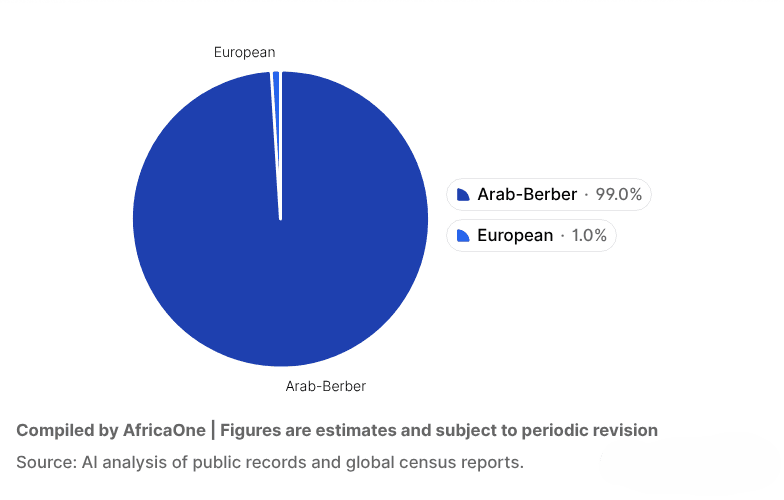




Religion
Religion plays a central role in the life of Algeria, with Islam being the dominant and state religion. The country’s religious landscape has been shaped by centuries of Islamic influence, along with traces of Berber, Christian, and Jewish traditions that predate the arrival of Islam. Sunni Islam is the form of Islam practiced by the overwhelming majority of Algerians (approximately 99%). The Maliki school of Sunni Islam is the dominant school of thought, which emphasizes community-based practices, traditionalism, and jurisprudence.
Islam shapes not only religious practices but also social customs, laws, and holidays across the country. It influences daily rituals, such as prayer, fasting during Ramadan, and charitable acts. Despite Algeria being officially a secular state, Islamic principles play a significant role in public life, especially in the public sphere, such as education, politics, and media. Islamic holidays like Eid al-Fitr, Eid al-Adha, and the Islamic New Year are widely celebrated, and many Algerians observe Ramadan by fasting from dawn until sunset. Christianity and Judaism once had notable presences in Algeria, but both communities have significantly declined in numbers over the years. The Christian population, mostly Roman Catholics and Protestants, was especially significant during the French colonial period but has since dwindled after independence. Today, the number of Christians is very small and mainly consists of expatriates or converts. The Jewish community has a long history in Algeria, but most Jews emigrated after Algeria gained independence in 1962, primarily moving to France or Israel. The Jewish population in Algeria today is minimal, though traces of Jewish heritage remain in certain regions, such as Algiers and Tlemcen.
Religious freedom is guaranteed by the Algerian constitution, but Islam remains the official religion. While non-Muslim minorities technically have the right to practice their faith, proselytizing (actively attempting to convert others to a different religion) is prohibited, and Christian missions are often subject to scrutiny. Islamic law (Sharia) is not implemented as the national legal framework but still influences certain aspects of family law, marriage, and inheritance.

Settlement patterns
Algeria's settlement patterns are deeply influenced by its geography, climate, and historical development. From the Mediterranean coastline to the vast Saharan desert, the distribution of Algeria's population is concentrated in specific regions, with urban areas in the north and more sparsely populated regions in the south. The majority of Algeria’s population (around 80%) lives in the northern region, which is more fertile and temperate, with a Mediterranean climate. This area is home to the country’s major cities and economic centers. The northern coastal strip along the Mediterranean Sea is the most densely populated region, where the Atlas Mountains meet the coast. This area provides access to natural resources, fertile land, and significant trade routes. The process of urbanization has rapidly accelerated in northern Algeria, with people moving from rural areas to cities in search of better economic opportunities, education, and services. The urban sprawl around cities like Algiers is a growing concern, with housing shortages, traffic congestion, and unemployment becoming significant challenges. The process of urbanization has rapidly accelerated in northern Algeria, with people moving from rural areas to cities in search of better economic opportunities, education, and services. The urban sprawl around cities like Algiers is a growing concern, with housing shortages, traffic congestion, and unemployment becoming significant challenges. Rural settlements in Algeria are typically small villages scattered across the north and highland regions. These settlements are often centered around agriculture and livestock farming. Internal migration in Algeria is driven by economic factors, with many people moving from rural areas to urban centers for better job opportunities, educational facilities, and access to healthcare.

The northern coastal strip along the Mediterranean Sea is the most densely populated region, where the Atlas Mountains meet the coast. This area provides access to natural resources, fertile land, and significant trade routes. Algiers, the capital and largest city, is located on the coast and serves as the political, economic, and cultural heart of the nation. Oran, Constantine, Annaba, and Blida are other major cities in the north, each serving as regional economic and cultural hubs.
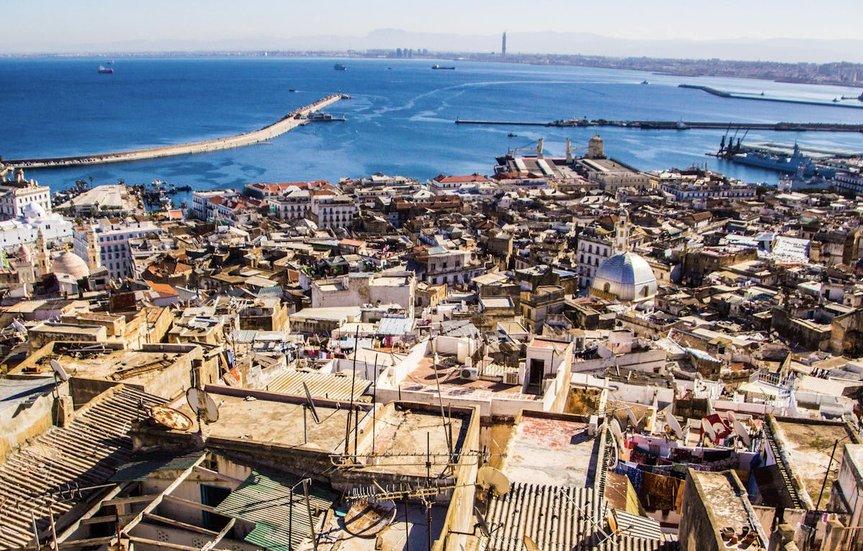
Urban Settlement
Algeria has experienced significant urbanization in recent decades, with the urban population increasing from a predominantly rural base to over 73% of the total population. This shift is driven by factors like industrialization, rural-to-urban migration, and government-led infrastructure projects. However, this rapid growth has also presented challenges such as housing shortages, informal settlements, and environmental concerns. The majority of Algeria's urban population is concentrated in the northern coastal region, with a much smaller percentage residing in the highlands and the vast southern Sahara desert. Rapid urban growth has led to challenges like housing shortages, informal settlements, inadequate public services, and environmental concerns such as deforestation and air pollution.

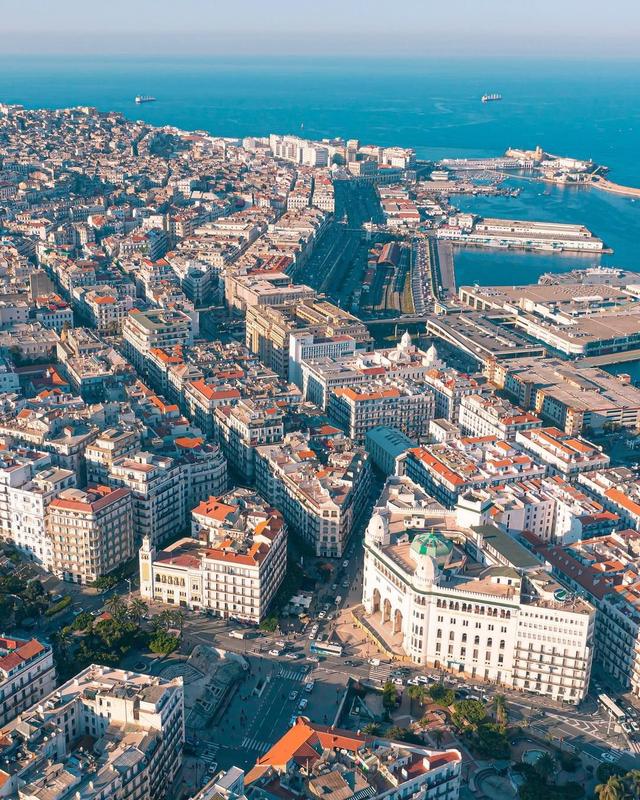
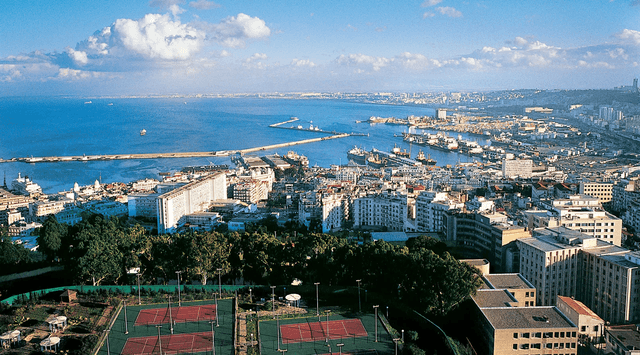

Demographic trends
Algeria, with its rich history, cultural diversity, and strategic location in North Africa, is undergoing significant demographic changes. These changes reflect a variety of factors, including population growth, urbanization, aging trends, and shifts in fertility rates. Understanding these demographic trends is key to assessing Algeria's economic and social future. Algeria's population has experienced significant growth in recent decades. The total population in 2023 is estimated at around 45 million people and is expected to continue growing in the coming years. This population growth has been driven by high birth rates and improvements in healthcare and living standards.
The country’s population has more than doubled since 1962, when Algeria gained independence. At that time, the population was only around 10 million. Algeria’s population growth rate has slowed down slightly over the past few decades, from over 3% annually in the 1960s to about 1.8% in recent years.
Despite the slowdown, the growth rate remains relatively high compared to global averages, which suggests a young and expanding population. Algeria is a young country, with a median age of about 30 years. Over 40% of the population is under the age of 25, which reflects a youth-heavy demographic.
This youthful population presents both opportunities (such as a large workforce) and challenges (including the need for job creation, education, and healthcare).
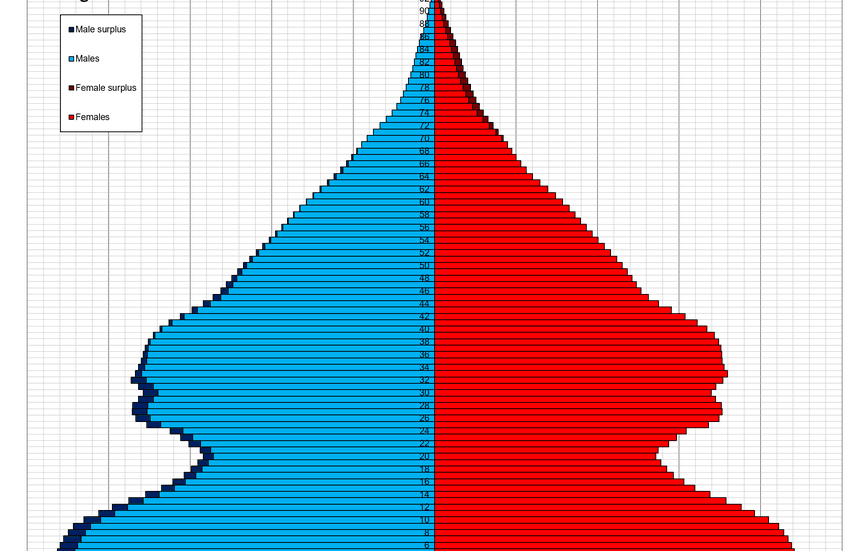
Touristic Cities
Algiers (The Capital City)
Algiers, the capital and largest city of Algeria, is situated along the Mediterranean coast and serves as the country's cultural, political, and economic hub. The city blends modern architecture with historical monuments. Key attractions are; Casbah of Algiers: A UNESCO World Heritage site, the Casbah is a maze of narrow alleys, traditional houses, and Ottoman palaces, showcasing the city's historical Arab-Islamic architecture, Notre-Dame d'Afrique: A beautiful Catholic basilica perched on a hill, offering panoramic views of the city and the Mediterranean Sea, Basilica of St. Augustine: A historical church showcasing the Christian legacy of the city, Algerian National Museum of Fine Arts: A museum displaying a rich collection of Algerian and international art, Martyrs’ Memorial: A symbol of the country’s independence struggle against French colonial rule.
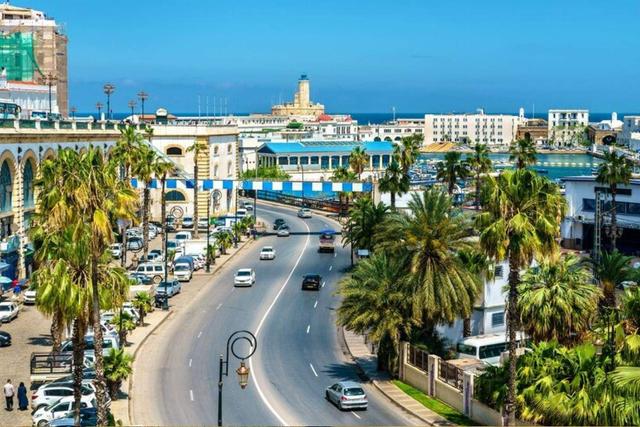



Oran (The Pearl of the West)
Located on the Mediterranean coast, Oran is Algeria’s second-largest city and a hub for commerce, culture, and tourism. The city is known for its vibrant music scene, including the famous Raï genre.
Key Attractions are Santa Cruz Fort: A historic fort that overlooks the city and offers stunning views of the sea, Le Palais de la Culture: A cultural center where visitors can experience art exhibitions, theater performances, and local music, The Great Mosque of Oran: A beautiful mosque reflecting the Islamic architecture of the region, The Corniche: A scenic coastal road offering picturesque views of the sea and an excellent place for a relaxing stroll.
Constantine (The City of Bridges)
Located in the northeast, Constantine is one of Algeria’s most historic cities, famously known as the City of Bridges due to its dramatic location on cliffs and the bridges that connect its different parts. Key Attractions are; The Suspension Bridge: The most iconic bridge in Constantine, which connects the two parts of the city, Palace of Ahmed Bey: A historical palace showcasing Ottoman architecture and providing insight into Constantine's past, The Roman Ruins of Timgad: Near Constantine, these ancient ruins reflect the Roman influence on the city and are recognized as a UNESCO World Heritage site, Mâa Khoulaa Mosque: An architectural masterpiece blending Islamic design with Ottoman influences,The city's cliff-side location offers breathtaking views of the surrounding valleys and the Rhumel River that runs through the city.

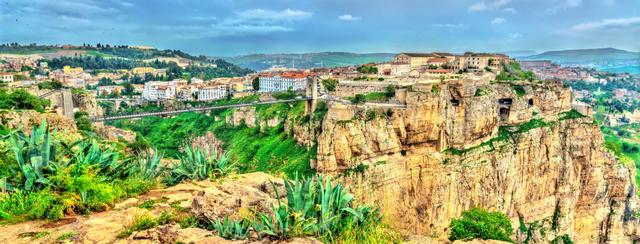


Ghardaïa (Gateway to the Sahara)
Located in the M'zab Valley, Ghardaïa is a historic city known for its unique architecture and Berber heritage. It is one of Algeria's Saharan oases and a UNESCO World Heritage site. The key attractions are; The M'zab Valley: A series of ancient fortified cities built by the Ibadi sect of Islam that still retain much of their original architecture, The Ksar of Ghardaïa: A maze-like city made of mud brick buildings, showcasing the traditional desert lifestyle, The M’zabian Culture: Experience the traditional lifestyle of the M’zab people, including their marketplaces and distinctive handicrafts.




Accomodation
Guest houses
In Algeria, guesthouses provide travelers with a more personalized, authentic, and often affordable alternative to larger hotels. Many of these establishments are family-run, offering guests the chance to experience traditional Algerian hospitality while staying in charming, historic, or remote locations. From coastal towns to desert oases, these guesthouses allow visitors to immerse themselves in local culture, enjoy home-cooked meals, and explore off-the-beaten-path attractions.



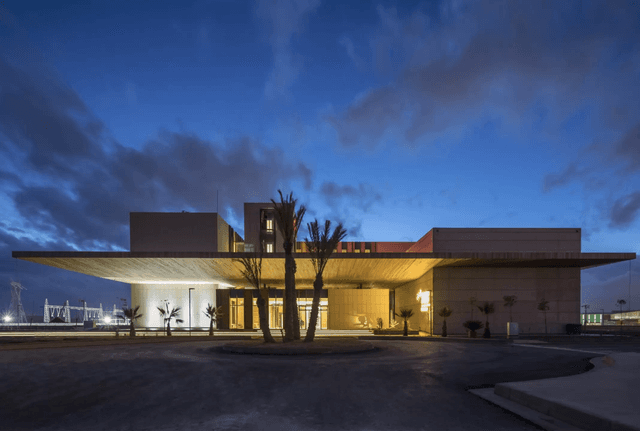
Hotels and resorts
Algeria offers a diverse selection of hotels and resorts, ranging from luxurious 5-star accommodations to more affordable options in cities and coastal regions. Whether you're visiting the bustling capital of Algiers, the historic city of Oran, or the tranquil Mediterranean coastline, you'll find a variety of modern hotels, seafront resorts, and desert retreats that cater to every traveler's needs.




Riads
While Riads are most commonly associated with Morocco, Algeria also offers a variety of similar traditional guesthouses that feature Arab-Islamic architecture, courtyards, and lush gardens. These guesthouses provide travelers with a unique opportunity to experience Algerian culture in a more intimate and authentic way. Often located in historic areas or old medinas, these riads offer a serene retreat from the bustling cities and a deeper connection with local customs and heritage.




Campings
Algeria offers diverse landscapes, from mountainous regions and Mediterranean coastlines to the vast Saharan desert. Camping in Algeria allows travelers to immerse themselves in these natural surroundings while experiencing a more authentic and affordable way to explore the country. Whether you're trekking through the Algerian Alps, venturing into the Saharan dunes, or camping near the Mediterranean, there are plenty of unique and scenic camping spots across Algeria.




Requirements for Visa
Documents to be submitted for your application
- Valid Passport
- Visa Application Form
- Passport-Sized Photographs
- Proof of Accommodation
- Travel Itinerary
- Proof of Financial Means
- Travel Insurance
- Visa Fee Payment
- Employment or School Enrollment Verification (for Business or Student Visas)
- Additional Documents (If Applicable)
- Health Certificate (if applicable)
- Special Requests (for Specific Visa Types)
At the time of visa issuance, please provide the following documents
- Passport
- Visa Issuance Fee Payment
- Proof of Accommodation (Finalized)
- Proof of Travel Insurance (Valid Coverage)
- Proof of Financial Means
- Final Travel Itinerary
- Health or Vaccination Certificates (if required)
- Additional Documentation (If Specific to Your Case) - Work Visa: If the visa is for work, you may be required to submit an employment contract or authorization from the Ministry of Labor in Algeria.
Student Visa: Provide an enrollment letter from your educational institution in Algeria or confirmation of your academic program.
Business Visa: Provide a letter of invitation from the Algerian company or organization and a business license or registration certificate from your employer. - Residence Permit (if applicable)
- Photocopy of the Application and Documents
Useful links
- Algerian Ministry of Foreign Affairs
- Algerian Embassy/Consulate Websites
- Algeria Tourism Website
- Algerian Immigration Service
- Algerian National Office of Tourism (ONT)
- International Travel Websites
- Embassy Websites for Special Visas
Economy of Algeria
Agriculture, forestry, and fishing
Agriculture, forestry, and fishing are important sectors in Algeria, contributing to the country’s economy and providing employment to a significant portion of the population, especially in rural areas. However, the sector faces challenges such as climate change, water scarcity, and the reliance on imported food products. Agriculture plays a critical role in Algeria’s economy but has been constrained by geographic and climatic limitations, particularly in the Saharan and semi-arid regions. Only about 3% of the country’s land is arable, and the majority of agricultural activity occurs in the northern regions (the coastal plains and the Tell Atlas mountain range), where rainfall is more abundant. Algeria’s forests cover around 2 million hectares, mainly in the northern coastal areas and the Tell Atlas mountain range. The country’s forests are rich in flora and fauna and play an important role in maintaining ecological balance, preventing soil erosion, and providing resources like timber and fuelwood. Algeria has a long Mediterranean coastline of around 1,200 kilometers, which supports a diverse marine ecosystem and contributes significantly to the country's fishing industry. However, Algeria’s fishing sector faces challenges such as overfishing, inadequate infrastructure, and poorly developed fish processing industries. Agriculture, forestry, and fishing are important pillars of Algeria’s economic structure, providing food, employment, and raw materials for local industries. However, these sectors are constrained by environmental challenges such as water scarcity, climate change, and overfishing. The government has made efforts to address these issues through various sustainability initiatives, land reclamation projects, and investment in modern infrastructure. If these sectors can be enhanced with the right technologies, management, and investment, they have the potential to contribute significantly to Algeria's economic growth, food security, and job creation.

Resources and power
Algeria possesses significant energy resources, with a dominant focus on hydrocarbons like crude oil and natural gas. The country also has substantial potential for renewable energy sources, particularly solar power. Algeria is a major global energy producer and exporter, playing a key role in the international energy market. Algeria ranks among the countries with the largest proven oil reserves, holding approximately 12.2 billion barrels. It also holds significant natural gas reserves, ranking tenth globally, and is a major exporter of natural gas. Algeria's vast desert areas receive abundant sunlight, making solar power a major area for potential development. The country aims to generate 15,000 megawatts from renewable sources by 2035, with solar photovoltaic power plants being a key component.
Manufacturing
Algeria's manufacturing sector is experiencing growth and diversification, with key industries including petrochemicals, food processing, construction materials, and pharmaceuticals. The government is actively working to attract investment and foster a more robust manufacturing base, aiming to reduce reliance on hydrocarbons and address a budget deficit. Petrochemicals and chemicals, food processing, construction materials, and pharmaceuticals are major manufacturing sectors in Algeria. Automotive assembly, electronics manufacturing, and renewable energy equipment are emerging as promising areas for expansion.

Finance
The finance sector in Algeria is a crucial component of the country's economy. The financial system has undergone significant reforms in recent decades, but it remains heavily influenced by the state and the country’s reliance on oil and gas revenues. The finance industry encompasses banking, insurance, capital markets, and financial regulations.
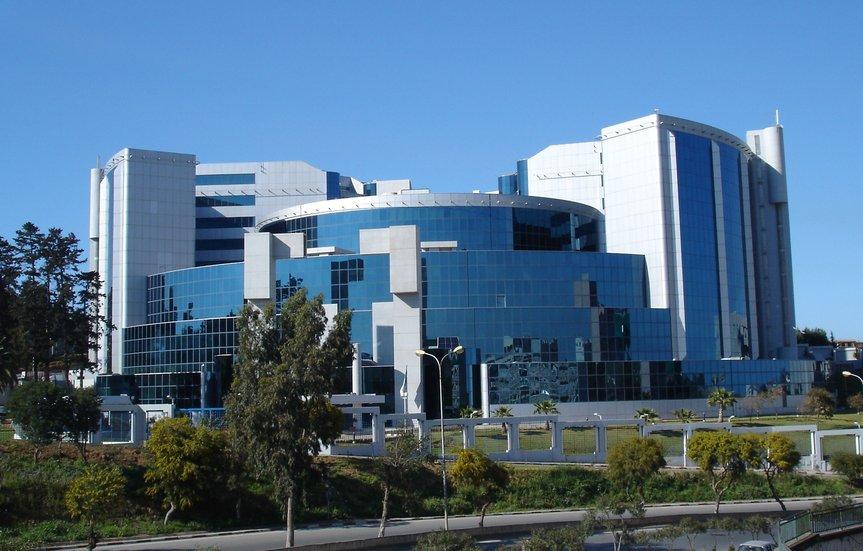
Trade
Trade is a vital component of Algeria's economy, heavily influenced by the country's oil and gas exports, which make up the bulk of its trade activities. Algeria has made significant efforts to diversify its trade and reduce its dependence on hydrocarbons, but the country still faces challenges in creating a balanced and sustainable trade framework. Algeria’s economy is highly reliant on its energy exports, particularly crude oil and natural gas, which dominate the country's trade balance. These products make up around 90% of Algeria’s total exports and around 30% of its GDP. Algeria is a major exporter of natural gas, ranking as one of the top suppliers to Europe. Gas exports primarily go to Italy, Spain, France, and Germany via pipelines and liquefied natural gas (LNG) shipments. Algeria produces a significant amount of crude oil, though its reserves are finite and the country faces competition from other oil-exporting nations. Algeria imports a wide range of products to support its domestic needs, many of which are not produced locally or are in limited supply. Imports constitute a significant part of Algeria’s trade deficit.
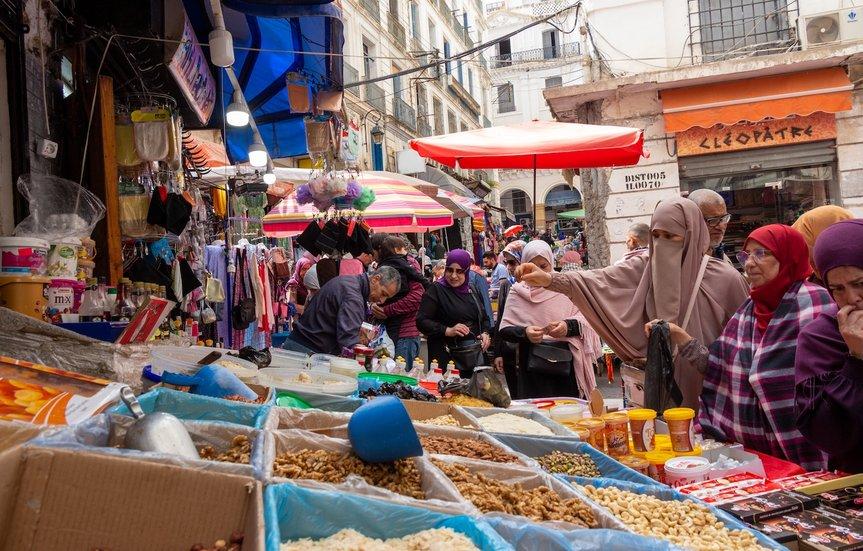
Labour and taxation
Algeria’s labour and taxation systems play significant roles in shaping the country’s economic and social development. With a large public sector, a relatively young population, and ongoing reforms, both systems face a combination of challenges and opportunities. The labour market in Algeria is characterized by high levels of youth unemployment, a large public sector, and a substantial informal economy. Algeria's population is relatively young, and many young people seek employment in the formal sector, but opportunities are often limited. One of the most pressing issues in Algeria is youth unemployment, with a significant portion of the population under the age of 30 unable to find formal sector jobs. The rate of youth unemployment is higher than the national average, and many young people are forced to work in the informal economy or emigrate for work opportunities abroad. The public sector is the largest employer in Algeria, with the government directly providing a significant number of jobs in sectors like education, healthcare, energy, and administration. The informal economy in Algeria is large, with many workers engaged in informal activities outside of official labour statistics. This includes agriculture, street vending, and small businesses. The labour force participation rate is relatively low, particularly among women, due to social and cultural factors, as well as the lack of opportunities for women in the workforce. The minimum wage in Algeria is determined by the government and is periodically adjusted to reflect changes in the cost of living. As of recent data, the minimum wage is set at around 18,000 Algerian dinars (DZD) per month. Algeria’s taxation system is relatively complex, with a mix of direct taxes, indirect taxes, and social security contributions. Tax collection is primarily managed by the Ministry of Finance, and the country’s tax policies are largely influenced by the government’s focus on oil and gas revenues, while efforts are underway to diversify the economy and improve tax compliance.
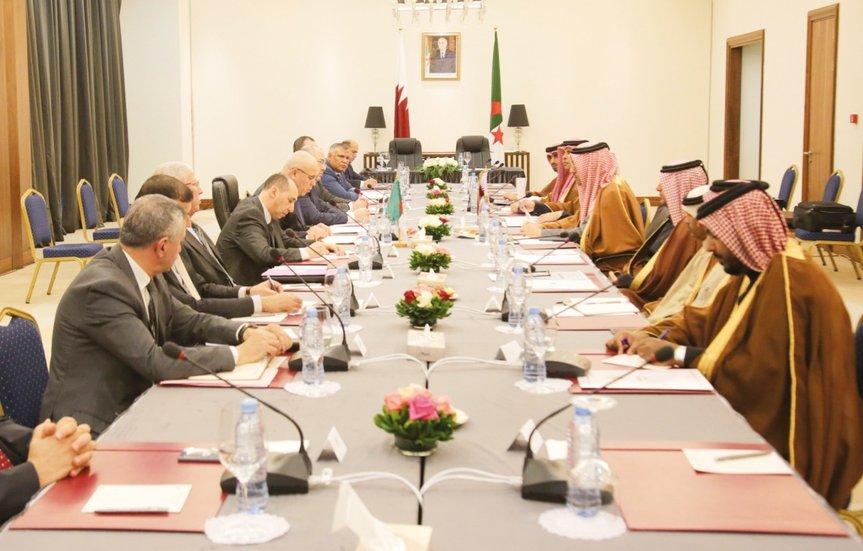
Transportation and telecommunications
Algeria's transportation and telecommunications sectors are both undergoing modernization, with ongoing infrastructure development and increasing service access. Telecommunications, in particular, is experiencing significant growth, driven by investments in mobile broadband and fiber optic networks. Public transportation is also seeing improvements, particularly in major cities like Algiers. Algeria's telecommunications infrastructure is being modernized, with increased access to the internet, mobile broadband (3G/4G), and fiber optic cables. The three main mobile network operators (MNOs) – Mobilis, Djezzy, and Ooredoo Algeria – are working to expand 5G services. Internet penetration is at 60 percent, with a notable 16 percent year-over-year increase. Algeria is modernizing its railway system with new "smart trains".These trains, manufactured by Alstom, are designed for both electric and diesel operation, capable of reaching 160 km/h. They feature modern amenities like air conditioning, comfortable seating, and a dining area, as well as low-floor access for passengers with reduced mobility.
